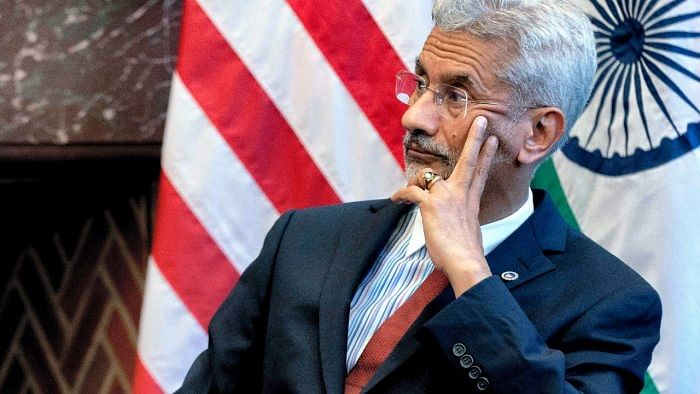
Indian social media has an unlikely star these days. Search for #Jaishankar, and there's an unending trove of memes, praises and commentary crediting India's External Affairs Minister, S Jaishankar, with holding a mirror to the West over its hypocrisies in foreign policy.
Indeed, Jaishankar — never known to be shy with words in private — has in recent weeks publicly pushed back with calibrated aggression against American and European criticism over New Delhi's refusal to publicly criticise Moscow over the war in Ukraine. It's a break from anything Indian diplomacy has seen in decades and could prove risky in a chaotic international climate where nations and their leaders are on edge.
But howsoever Jaishankar's approach plays out on the global stage, his scathing public comments represent smart politics. A career diplomat since he joined the foreign service 35 years ago, Jaishankar is now turning foreign policy into a sharp tool for domestic politics so successfully that he is drawing plaudits from opposition leaders.
When British Foreign Secretary Liz Truss visited India earlier this month, New Delhi was facing questions in sections of the Western press over its decision to increase its purchase of Russian oil after Moscow offered the crude at discounted prices. Asked about it at a public conversation with Truss, Jaishankar shot back by suggesting there was a "campaign" to target India when in fact, Europe purchases far more oil from Russia. Truss was left visibly uneasy by Jaishankar's response.
Days later, the Indian minister was in Washington for a meeting of the '2+2' mechanism between the world's two largest democracies. The platform involves foreign and defence ministers of the two countries meeting together. At a press conference after the meeting, Jaishankar was again asked about India's oil imports from Russia. The Indian minister calmly suggested that India buys as much Russian crude in a month as Europe likely does "in an afternoon." US Secretary of State Anthony Blinken said he had raised concerns over human rights violations in India during the meeting. The very next day, Jaishankar told reporters that India also has concerns about incidents of human rights violations in other countries, including the US, and that it shares those worries with Washington.
And earlier this week in New Delhi, Jaishankar responded to fresh questions from two European foreign ministers about India's neutral stand on the war in Ukraine by referring to the silence from the West when China was amassing its troops in Ladakh two years ago. "When rules-based order was under threat in Asia, the advice we got from Europe was to do more trade," Jaishankar said. "At least we are not giving you that advice." The Indian minister also referred to the US-led West's chaotic and embarrassing withdrawal from Afghanistan last year through a deal with the Taliban. "Please tell me which part of the rules-based order justifies what the world did there," he asked.
Jaishankar isn't wrong to point out the West's hypocrisy when it comes to the observance of international law and democratic values. But his approach represents a diplomatic gamble. It's a more sophisticated — and softer — version of the aggressive "wolf warrior diplomacy" that has backfired on China in recent years, turning many nations against Beijing. Pointing out another country's double standards doesn't hide one's own duplicity.
Historically, India has largely chosen to avoid public battles with friends in front of the cameras, instead communicating its unhappiness to partners behind closed doors. Jaishankar's readiness to respond to slights with public jabs of his own marks a shift that could come across as reflecting a government that's over-sensitive and defensive about its actions, just as much as it could — to supporters — signal a more confident India.
And some of Jaishankar's recent statements have been little more than empty bluster. At the Raisina Dialogue, India's premier foreign policy and security conference, the Indian minister suggested that the government of Prime Minister Narendra Modi doesn't care for "approval from other quarters."
That is simply not true. From public relations campaigns aimed at pitching Modi as the world's most popular leader in voting carried out by Time magazine to hyping little-known international awards, the government and prime minister have sadly demonstrated a cringe-inducing hunger for Western recognition.
The very fact that Jaishankar feels the need to respond the way he does underscores just how much Western criticism upsets the government.
Yet, for all of these diplomatic risks and limitations of Jaishankar's approach, there's no denying that it has struck a chord with many across political lines in India. "Superb," is how Priyanka Chaturvedi, a Member of Parliament from the opposition Shiv Sena, described the minister's retort to questions on India's import of Russian oil during his visit to the US.
As a post-colonial nation, few things unite the Indian polity and resonate with ordinary people in this country like an act of defiance against the West. Indira Gandhi gained from it in the 1970s, as did Atal Behari Vajpayee in 1998, when India tested nuclear weapons despite knowing that the move would attract Western sanctions. Now, family WhatsApp groups are forwarding clips of Jaishankar's recent comments.
Two months ago, the Modi government was facing tough criticism over its struggles to evacuate 20,000 Indian students from Ukraine. Today, the domestic narrative on India's response to the war has flipped. A man trained to secure diplomatic successes has delivered a political win.
(Charu Sudan Kasturi is a journalist)